You see them saturating your social media news feeds and cluttering entertainment websites. Critics tear into the latest Adam Sandler vehicle and creatively bankrupt studio sequel with gusto as they unveil their picks for the most egregious wastes of celluloid (or digital content) they endured this year. You can probably read between the listicle lines: “I had to sit through these many duds in the past 12 months. It's payback time,” these weary reviewers convey with their snarky prose.
And now it's my turn. I usually refrain from worst-of lists, at least in print for all to see. This year, however, a handful of films that garnered praise from critics and audiences alike left me scratching my head in bewilderment or boiling mad with rage. How come audiences championed these films and gave other (far more worthy) releases the cold shoulder?
When it comes to putting together these lists, you see, going for the easy targets is an exercise in redundancy. It's pointing out the obvious for a couple of chuckles. While this list inevitably features some of those disasters, I'm more interested in going for the undeserving studio hits, the darlings of the film festival circuit, and even the prestige projects engineered to yield the highest awards-season exposure and elicit Pavlovian drooling from voting industry members and critic groups.
Yes, fans of the following turkeys, I am trying to piss you off. How am I doing?
10. Goosebumps: The wildly popular series of mystery books by R.L. Stine passed me by from a generational standpoint. By the time they came out I was too old to really get into them. (I was too busy reading Stephen King and Clive Barker.) But I appreciated the author's intent: To create genuinely suspenseful yarns that grabbed a young reader's attention without diluting the fright factor. Which makes it so frustrating that this stillborn homage to the subgenre that made Stine a household name became a runaway hit. The central conceit, that the master copies of Stine's books house the evil entities propelling those stories, promised wicked popcorn fun at the multiplex. But director Rob Letterman (Monsters vs. Aliens) and screenwriter Darren Lemke (Jack the Giant Slayer) had no idea what to do once they let the genie out of the bottle … other than rip off Jumanji, The Monster Squad and The Spiderwick Chronicles, but without those films' impish sense of fun. Headlining the tone-deaf, shoddily executed proceedings is a glum Jack Black playing the Hollywood version of Stine. He turns this scare-free fiasco into a real chore to sit through. Plus it looks like it was shot with a cheap digital camera. (In other words, like sh*t.)
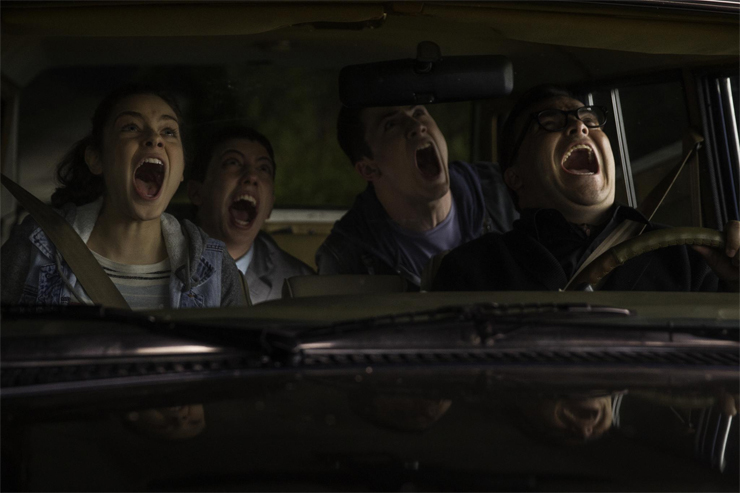
Goosebumps: (From Left): Ryan Lee, Odeya Rush, Dylan Minnette, Jack Black.
9. Mortdecai: Lionsgate tried to hide this painfully unfunny caper from reviewing press, so I took the most sensible course of action: I paid to see it during its first week of release. A Razzie-bound Johnny Depp thinks he can outdo Mike Myers in the spy spoof game, but director David Koepp (yes, the same David Koepp who adapted Jurassic Park for the screen) and screenwriter Eric Aronson are too enamored of their bourgeois-scum concoction to notice his grating shenanigans might tickle their own funny bones, but they sure don't yield any laughs on the receiving end of the screen, especially not when turning Depp's curlicued mustache into a running joke. Rounding out the surprisingly overqualified cast that goes down with the ship are Gwyneth Paltrow, Paul Bettany, Ewan McGregor, Olivia Munn and Jeff Goldblum, the only one nailing the daffy absurdity of the material.
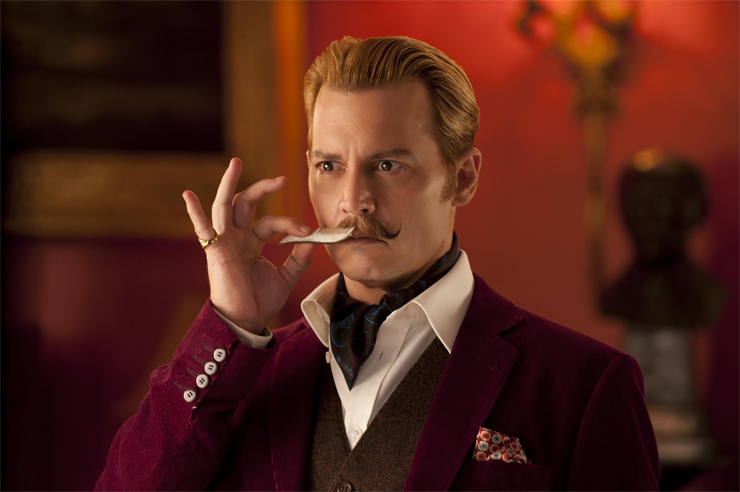
Mortdecai: Johnny Depp.
8. The Danish Girl: Out Christmas Day looking for your pity and your Oscar votes is the latest nail in the coffin of the once-promising career of Tom Hooper (HBO's John Adams, The King's Speech). In attempting to tell the true story of transgender pioneer Lili Elbe (née landscape painter Einar Wegener), the director replaces the Dutch-tilt overkill of Les Miserables with an ill-advised overreliance on wide shots that, instead of vividly capturing 1920s Copenhagen, enhance the playing-dress-up quality of the production in general and the central performances of Eddie Redmayne (stiff and unconvincing as Einar/Lili) and the ubiquitous Alicia Vikander (faring better as Einar/Lili's wife and fellow artist Gerda Wegener) in particular. Even more damning than the misconceived production values (really, seeing the first hour of this film feels like you've been doused in French perfume) is the filmmakers' utter failure in conveying Lili's inner flowering beyond the most superficial terms. Gerda's stoic suffering mirrored my torment as this irredeemably dull sudser went from ponderous to inane. It all leads to the most ludicrous ending of the year, a moment of such unintentional hilarity that it's simply begging for ridicule. How could I possibly resist? Let it fly... straight into the toilet.
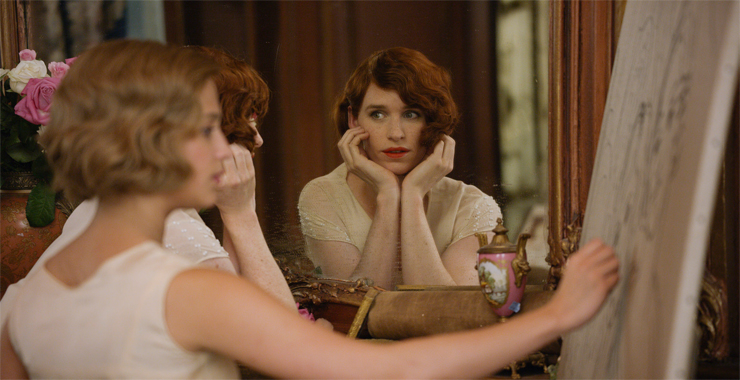
The Danish Girl: Alicia Vikander (foreground), Eddie Redmayne.
7. Irrational Man: Woody Allen reaches a nadir of sorts with yet another crime-and-punishment hodgepodge that recycles material from better films, only this time the setting is a New England college campus. The gist: washed-up philosophy professor, played by a somnambulant Joaquin Phoenix, discovers the solution to his existential doldrums lies in the love of a (much younger) student (Emma Stone) and in plotting a heinous act that will bring good to the world, if he's ballsy enough to pull it off. I'd call Phoenix's character arc cartoonish, but this is supposed to be Woody in serious mode … which makes a howler of a climax that hinges on a pratfall all the more moronic. (Think the climactic punchline in The Naked Gun 2 ½, played straight.)
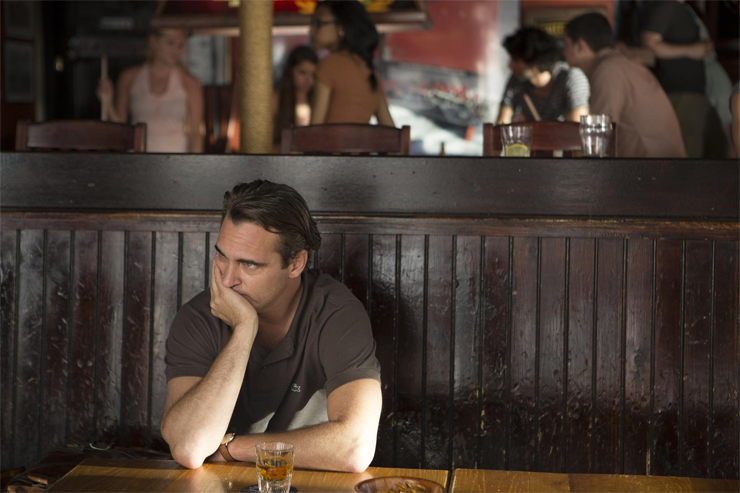
Irrational Man: Joaquin Phoenix.
6. Fantastic Four: I couldn't bring myself to review this train wreck of a superhero origin tale this past summer, not because I wasn't up to the task of tearing another Marvel reboot to shreds, but because I had high hopes that Chronicle director Josh Trank would bring a fresh approach to this project made outside the Borg-like grip of the Marvel Cinematic Universe (read: not Disney). And for the first 40 minutes or so, it seemed like all those reports of behind-the-scenes squabbles and massive reshoots were being blown out of proportion. Then the movie, which wastes the considerable talents of Miles Teller, Michael B. Jordan, Kate Mara and Jamie Bell as the titular do-gooders, proceeds to disintegrate in spectacular fashion. It marries Trank's best intentions to examine these iconic characters seriously with the most deplorable kind of studio interference. As the nefarious Doctor Doom, Toby Kebbell ends up saddled with some of the ugliest makeup ever to grace a multiplex. (Yep. He's a knee-slapper.)
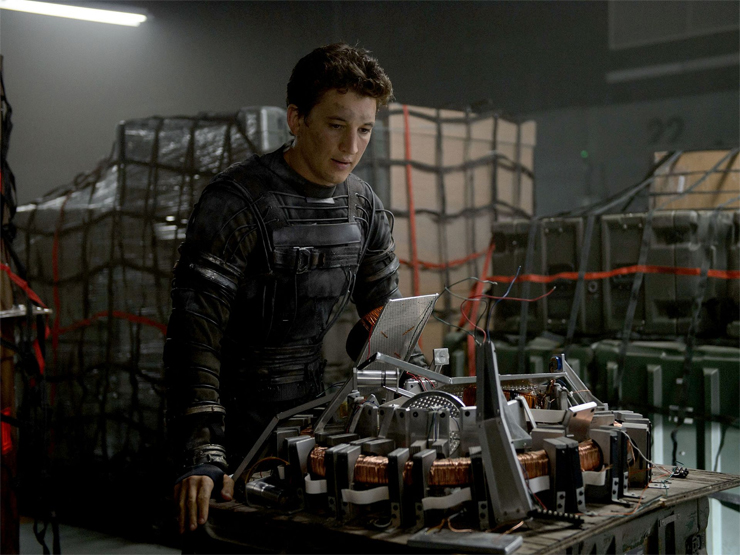
Fantastic Four: Miles Teller.
5. Wild Tales (Relatos salvajes): Argentina's entry for the 2014 Foreign Language Feature Oscar tells the kooky story of plane passengers who are mysteriously connected. No, that's not quite right. It follows a diner waitress who realizes she's serving the man who ruined her family's lives. Actually, it's about this a-hole driving an Audi who engages in a war of wills on a desert highway with another a-hole driving a beat-up jalopy. Hmm, not quite. It chronicles a demolitions expert, played by Ricardo Darín, rising up against the inefficient bureaucracy that's made his life hell since his car was improperly towed. But not really. It's about this well-off patriarch who tries to talk his groundskeeper into taking the blame for his son's hit-and-run. You're too slow, man. There's this loud Jewish wedding reception, right?
Only it's about to go to hell after the bride finds out her husband's a duplicitous mo-fo. And that's all the time we have! Thanks for watching. This barbed, mean-spirited anthology of revenge-themed shorts, which kicked off the 2015 Miami International Film Festival, purports to poke fun at certain aspects of Argentinean society, but the only thing it engendered in me was contempt, for the one-dimensional characters and for writer-director Damián Szifrón, who pairs up a toxic worldview with the attention span of a gnat. These bon-bons of malice and ill will mistake empty cynicism for wit, and are as fun to sit through as fingernails on a chalkboard. Get back to me when you can prove, a) you're capable of sustaining a feature-length narrative, and b) you're capable of giving a damn about your characters.
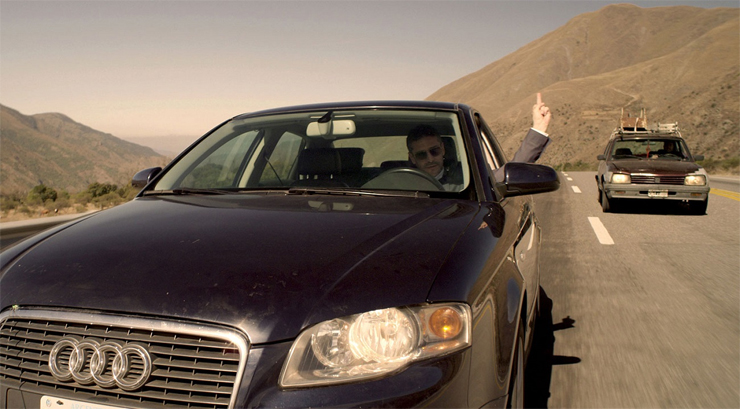
Wild Tales: Leonardo Sbaraglia.
4. Stonewall: A foray into the birth of the U.S. gay rights movement that hates the LGBT community, Roland Emmerich's coming-of-age history lesson proves he needs to go back to disaster epics, because between this misbegotten dud and Anonymous, his lame-brained, Elizabethan conspiracy-theory washout, it's clear he has no business directing drama. The list of missteps goes on and on: choosing to tell the story from the point of view of an Anglo, newly out twink (War Horse's Jeremy Irvine) fresh off the bus on Christopher Street; reducing most of the minority roles to grotesque caricatures; “rewarding” our protagonist's sexual appetite with humiliation and punishment, both emotional and physical. Its biggest offense, though, is positing that gays and lesbians' struggle for equality amounts to a hill of beans next to the more vital matter of getting to go back to your podunk hometown, head held high, sporting some cool, big-city shades. That trumps every single 20th century civil rights victory known to humankind.
(We're about to reach the bottom of the barrel, readers. Can you feel the excitement?)
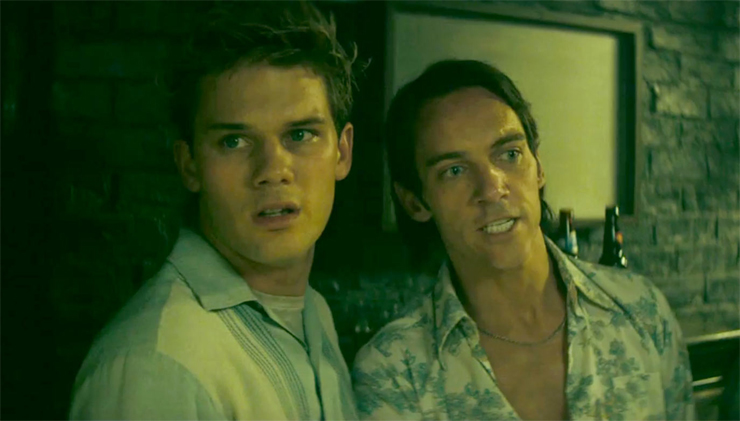
Stonewall: (From Left): Jeremy Irvine, Jonathan Rhys Myers.
3. Entourage: When I say that Doug Ellin's big-screen version of his hit HBO series is jaw-droppingly awful, it's coming from someone who liked the show, cringe-inducing celebration of the bro lifestyle and all. In revisiting the lives of Vinnie Chase (oh, Adrian Grenier, what happened to your career?) and his merry band of mischief makers as they mastermind his comeback, Ellin blows a golden opportunity to use his broader canvas to explore the creative process a la Project Greenlight, only with dick jokes and gratuitous T & A. Unwisely, he didn't follow the approach Michael Patrick King took in retrofitting Sex and the City for the big screen; King essentially compressed a season's worth of content on each film. Ellin, by contrast, is too hung up on keeping the party going like it's 1995, and the un-PC jokes that might have popped in a half-hour format here land with a thud. There aren't enough Ari Gold meltdowns to redeem this kind of lazy, uninspired filmmaking.
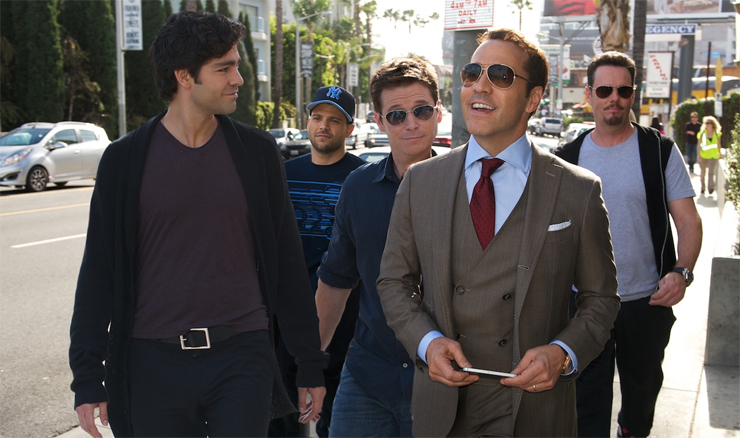
Entourage: Adrian Grenier, Jerry Ferrara, Kevin Connolly, Jeremy Piven, Kevin Dillon.
2. The Visit: M. Night Shyamalan wants you to like him again. How much does he want you to like him again? I'm so glad you asked. He threw out the polished mise-en-scene and slow-burn moroseness of his earlier work and aimed to break new ground … by throwing his hat in the found-footage ring. But that's not all; he also went for sinister laughs in telling the story of a budding filmmaker (Olivia DeJonge) who goes to stay with her maternal grandparents (her mom's estranged parents) along with her baby brother (Ed Oxenbould), who likes to rap. It's a tough balancing act for any director, mixing frights and humor, and when it works (Drag Me to Hell), the results are dazzling. But in trying to abide by the low-rent aesthetic he imposed on himself in depicting the kids' sinking feeling that there's something off about Nana (Deanna Dunagan) and Pop Pop (Peter McRobbie), the Unbreakable auteur leeches any sense of dread from the picture. He also cheats by pairing the teenage protagonist's rough-around-the-edges footage with an intricate sound mix. But when The Visit really goes off the rails is after the big reveal, a twist with a surprise quotient of minus 10, when Shyamalan's millennial Hansel and Gretel start doing things two suburban brats are wholly incapable of pulling off. Unwatchable.
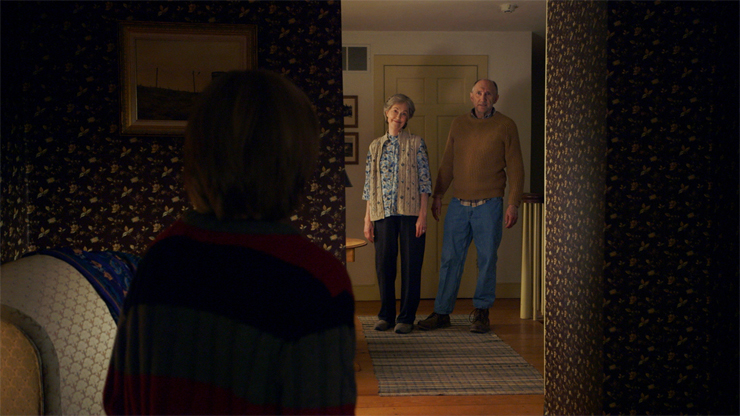
The Visit: Deanna Dunagan, Peter McRobbie.
1. Me and Earl and the Dying Girl: The winner of the Grand Jury Prize at the 2015 Sundance Film Festival encapsulates everything that's wrong with indie films nowadays, a far worse offender than any studio cashgrab. The precious, aggressively quirky tale of high school dweeb Greg (Thomas Mann), his last-minute friendship with Rachel his terminally ill neighbor (Bates Motel's Olivia Cooke), and his bond with token African-American pal Earl (RJ Cyler), expressed in a series of homemade mini-remakes of classic movies that play like a cover-band version of early Wes Anderson. Did I mention there cutesy animated, because why not pile on the sickly-sweet whimsy? Glee alum Alfonso Gomez-Rejon's penchant for pretentious widescreen tableaux recalls Zach Braff's Garden State at its most insufferable, but what brings on the facepalms in this adaptation of Jesse Andrews' YA novel is the way it reduces Cooke's character to a plot device in her own story. Rachel exists to provide Greg with his catharsis, as well as a ticket to get into college. Watching the movie deprive her of her dignity is the most painful experience I had to endure at the movies in 2015 … and I have already seen The Revenant.
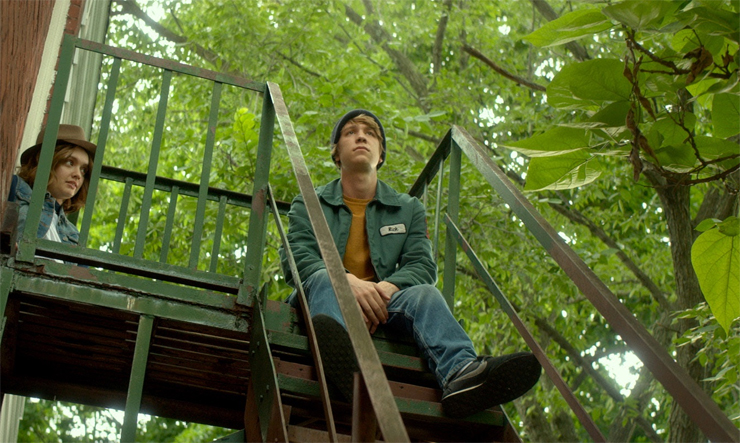
Me and Earl and the Dying Girl: (From Left): Olivia Cooke, Thomas Mann.
 MAIN MENU
MAIN MENU

